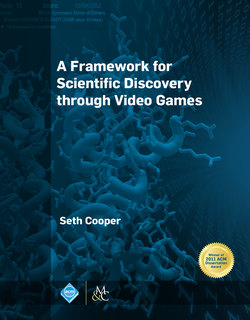Читать книгу A Framework for Scientific Discovery through Video Games - Seth Cooper - Страница 8
На сайте Литреса книга снята с продажи.
ОглавлениеPreface
When we first set out to create Foldit over six years ago, it wasn’t clear that a game-based approach to scientific discovery would work. So we planned from the start for the game to be continually adapting and changing, in order to keep improving based on the lessons we’d learn. It took several years of design, development, and continued iteration from a team of computer scientists and biochemists until the game was at a point where we made our first exciting discovery. The nature of the challenging problems we were facing required this time and refinement to solve.
We are now seeing a number of other games that allow players to contribute to scientific research. Muchof this growth has been in fields related to biology and biochemistry: EteRNA for designing RNA shapes, EyeWire for mapping neurons, and Phylo for aligning genetic sequences. Each of these games has had exciting scientific results produced by gameplay. Games are being applied in other areas as well, such as in the Algoraph suite of games for solving graph theory problems. I have been involved in the development of two more science games:Nanocrafter, which aims to push the frontiers of DNA-based synthetic biology, and Flow Jam, which allows players to help formally verify software.
The Foldit community has continued to grow and adapt to the new scientific challenges that we have posed. We have continued to look further into the design of synthetic proteins and their applications for health and understanding proteins. The Foldit team is continually grateful to the player community for their creativity, problem solving, and enthusiasm. Their brainpower and fresh insights have been critical to the successes of the project; without the players, there would be no game.
Scientific discovery games are an exciting part of the growing effort towards engaging the public in science. I look forward to new ways for anyone with an interest and a passion to contribute to scientific discovery.
Acknowledgments
There are many people to thank for helping and supporting me during the creation of this book.
•my advisor, Zoran Popović, for his guidance, support, and the opportunity to work on such a great video game as part of my research;
•David Baker for his expertise and time for helping make this a successful project;
•my committee members, David Salesin, John Zahorjan, and Ethan Merrit, for their valuable feedback throughout the project;
•the Foldit development team—Adrien Treuille and Janos Barbero were instrumental at the very beginning of the project, starting off on the considerable task of creating Foldit;
•the members of the Baker lab for lending their considerable biochemical expertise to the project. Firas Khatib contributed excellent biochemical insight and interaction with the Foldit community, and Andrew Leaver-Fay was always available and helpful in understanding the Rosetta codebase;
•the community of Foldit players for their enormous contribution to this work, for always surprising me with their ingenuity, and for their patience with the development of the game; and
•my parents, Harris and Beth Cooper, my sister, Emily Cooper, and my wife, Fayette Shaw, for all their help and support throughout school.
My work was supported by the National Science Foundation, DARPA, the Howard Hughes Medical Institute, NVIDIA, Electronic Arts, Sony, Microsoft, and Adobe.
Seth Cooper
July 2014
